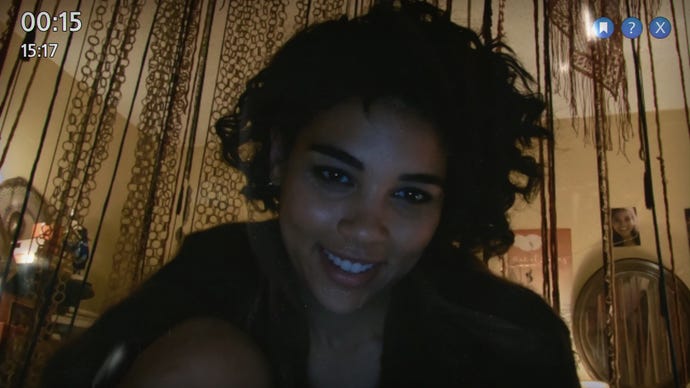Sam Barlow Takes Us Inside Telling Lies, His Star-Studded Follow-Up to Her Story
Director and writer Sam Barlow breaks down his new mega-ambitious game, Telling Lies.
This article first appeared on USgamer, a partner publication of VG247. Some content, such as this article, has been migrated to VG247 for posterity after USgamer's closure - but it has not been edited or further vetted by the VG247 team.
Everyone's moment where they figure out the mystery at the center of Her Story is different, and that's the beauty of it. It's a murder mystery, sure, but it's a murder mystery that people solve through their own investigative instincts. For 2015, it was revolutionary not just as a standout indie game, but as proof that there was legitimacy in live-action full motion video (FMV) in video games.
Formerly lone developer Sam Barlow didn't see it as such though. He knew it was risky, and was just making a game that he knew at least he would love. He tells me at this year's Game Developers Conference about the time he told fellow game designer Mike Bithell about it pre-release, who he remembers doing his best to be nice "but you could tell he's thinking poor guy, he's wasting his time making something like this." Her Story in 2015 was a crazy pitch. But against the odds, it was successful, as proven by Her Story's impressive game of the year victory lap.
"The biggest fear in developing this [next game] for me has been in following up something which was such a success. And where everything seemed to go right without necessarily, you know, a lot of times by accident or by luck. It's like daunting to then follow it up," Barlow tells me—tea in one hand, phone he says he recently dropped that hasn't quite worked right ever since in the other. "So I was like, I want this to be as risky and as exciting as Her Story was when I was developing that. I want to feel like I'm doing something interesting and surprising still, on top of what I did on Her Story."
So in comes Telling Lies, which unveiled its first cryptic teaser trailer this morning and a new Steam page for wishlisting. It's so cryptic that it doesn't reveal much at all—when pressing Barlow, he wouldn't even tell me the names of the four characters that actors Logan Marshall-Green (The Invitation, Upgrade), Alexandra Shipp (X-Men Apocalypse), Kerry Bishé (Halt and Catch Fire), and Angela Sarafyan (Westworld) portray. Vivien Lyra Blair (Bird Box) also plays a recurring role.
He did, however, divulge the overarching premise. At the start of Telling Lies, you see a woman leap out of a car in the dark of night, who then runs into a Brooklyn apartment and plugs in an external harddrive into a laptop. She opens up the laptop, and you discover that the hard drive she's plugged in is a stolen NSA database carrying footage spanning two years in the lives of four people. The NSA, we see, has tapped their conversations over phone calls (like FaceTime), Skype, and other things too. Now, it's up to you to parse through it all, piece together why the NSA was closely watching all these people, and figure out why it's a matter of NSA business in the first place.
"It's the title Telling Lies, but a big thematic thing here is you have these various people who are in relationships, and to what extent are they being truthful with each other when they project a version of themselves with someone else," says Barlow. "How are they being truthful with themselves? So there's lots of events and things that happen in this story where it's interesting to interrogate whether the person is doing this for good reasons, did they mean this thing they did or said? And really to answer those questions, you're digging further and further into these characters' lives, but it has a very different texture to Her Story because the camera is showing you into all these worlds, and it spans two years."
Telling Lies follows four main characters on the east and west coasts of the United States. While Barlow is hesitant to detail specifics, he says that he pitches it to others as "Sex, Lies, and Videotape meets The Conversation," in addition to its key influence from books like Sherry Turkle's Reclaiming Conversation. Telling Lies will follow themes like familial relationships, privacy, and the intersection of government into our lives.
Telling Lies, as Her Story encouraged, is about more than just listening to and watching videos. It's about observing body language and how people interact with others. It's about interrogating the details in every scene, like how one character's apartment changes over the course of two years.
"One of the pleasures of this game is not even necessarily the moments where people are speaking, but the moments where they're not speaking; where they're listening to other people. There's one scene where there's seven minutes of Logan washing dishes and watching something," explains Barlow. "That can be super interesting if you know the context of what's just happened. If you know what he's seeing on his screen, if you know what's going on in his head. Like this becomes a really interesting thing to lean in and scrutinize."
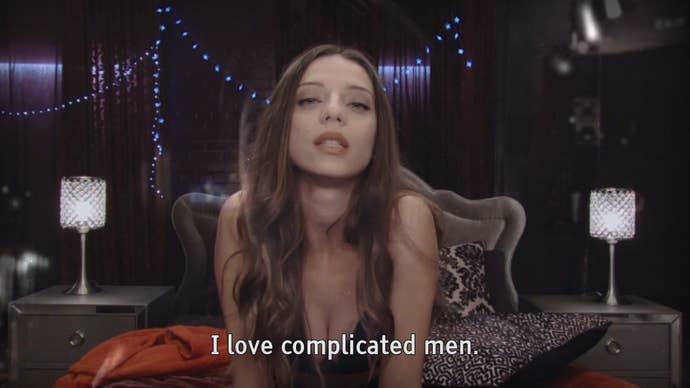
Telling Lies, by all accounts, sounds a lot more ambitious than Her Story. But it's by design. Barlow wants to tell this story in a very specific way, which he knows will be more complex, something unlike Her Story and the interactive web series #WarGames he did just last year. And Telling Lies is a lot bigger too, with "four or five times" as much content as there was in Her Story.
He describes the exploration of Telling Lies' complex web of narratives as being semi-inspired by The Legend of Zelda: Breath of the Wild, another game that rewards players endlessly for their curiosity. He hopes that in Telling Lies, players will likewise explore whatever story threads they desire, and come away with some new ideas about character dynamics or the story itself.
Scrubbing Videos
Unlike Her Story's relatively narrow scope, Telling Lies has four leads. In playtests, Barlow explains how often players connect with one main character out of the four, and chase down their specific leads through search terms (a mechanic that carries over from Her Story, in a more refined manner) or with Telling Lies' new mechanic, where you can tap a certain word that appears in the subtitles to jump you to another clip's point.
Exploring the videos, as you always hop in right wherever the word you search for comes in, is what Barlow calls "scrubbing." In scrubbing you can fast forward, rewind, and most importantly, freeze frame moments. The further you scroll, the faster the clip goes. He compares the experience to being a video editor, with unedited footage laid out in front of you.
"Here's a very bad example, but they might [say], 'No, you know I hate peanut butter.' Then you're like 'oh, peanut butter.' And then it skips to the other side where someone's like, 'shall I make you a peanut butter sandwich?' But you kind of find yourself jumping back and forth between the two sides," says Barlow. For instance, phone calls will always be one-sided, but once you figure out who they're talking to, you can hop back and put together both sides of the conversation.
"Like with Her Story, you're able to infer from rhetorical devices and what's been said, kind of the crux of the conversation. But you're also scrutinizing their face to pick up on the subtext, like how do they feel about what's being said, and then that fires your imagination of what's going on on the other side of the call. Then you'll play the fun game of then trying to get to the other side of the call."
Telling Lies is about what happens between the "big story points." For instance, watching two characters Skyping while they're apart may be the only glimpse you get into their relationship. He compares it to someone running on stage during a Shakespearean play, wounded and saying there was a huge battle off stage.
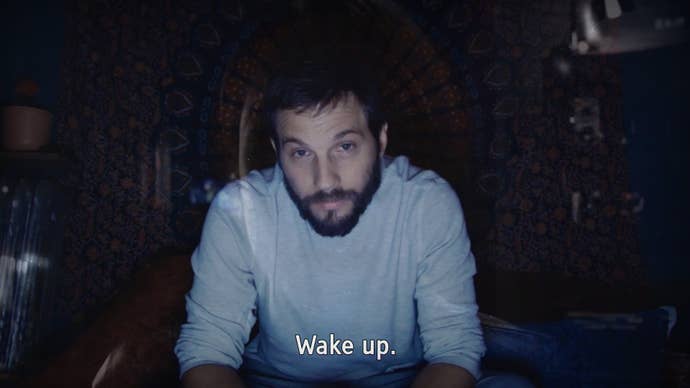
"What you imagine in your head is better than any battle they could have created on stage," says Barlow. "If we made a movie of this story you wouldn't see any of these scenes, we would be shooting the bits where the action is occurring in other places, so it's very interesting to spend all of our time in these more intimate conversations and domestic spaces; in bedrooms, around people's houses and apartments and stuff. It's an interesting texture that is not usual in video games where everything is usually much more external action and drama and stuff."
More Than Just Barlow
To match the wider scope, Barlow employed more than just himself and a composer this time around. He has a co-writer in Amelia Gray, who has written on the shows Mr. Robot and Maniac, in addition to her own novels and short stories. "It's cool because her being even darker than me meant that I wasn't always the one that was pushing things," Barlow says of Gray's work. "And people [would be] like, 'do you really want to go there?' I'd be like, 'that wasn't me! That was Amelia, she wrote that bit!'"
Telling Lies also boasts a dynamic score from England-based composer Nainita Desai. It's performed by the London Contemporary Orchestra, who have worked on the likes of Phantom Thread, There Will Be Blood, and Moonlight. "I think we actually spent more money on music clearances on this game than I did on the whole game on Her Story," Barlow adds, regarding the music that will appear in the game. A large swath of the development was done by a company called Furious Bee; Barlow specifically commends technical director and coder Lizi Atwood for playing a huge role in bringing Telling Lies to life.
"I mean it's weird because I think of this as being like a very indie game because for the vast majority of it, it's been me developing it. Even when we were up and running, it was essentially me and Lizi doing the vast majority of the work," says Barlow. "But then came the point we went for three months to LA and shot it, and suddenly we had a whole crew of people coming in and bringing their expertise."
Barlow compares the experience to his time as a game director on bigger projects like Silent Hill: Shattered Memories, where he'd sit in on every meeting. He found that when the team went to Los Angeles to shoot the videos for Telling Lies, it was much easier to delegate tasks on a film set than it was as the director at a large-scale game studio because everyone present is always focused on just one particular task, such as shooting a scene.
"It was just such a delight. We shot everything on location because I wanted these spaces to be real, but it was really surreal too. The way we shot it, we'd block it out mostly based on characters and roughly in chronological order," says Barlow. "We'd have Logan in an apartment over here doing his thing. And every now and then a character during a break or something would leave their location and come over and step into the other's and it was like you crossed the streams or something, because it felt so real to be in those locations that were just fully dressed places that these characters were inhabiting. Then the next day we'd move to a different location and you'd really feel the jolt in space and time because it was just beyond the set was so immersive. You know it had a lot less of the artifice that you would have in a normal movie."
The core conceit of Telling Lies is that the majority of the videos are captured from phones, webcams, and other methods. To simulate that, rigs were built for the actors to simulate phones, laptops, and more to capture their surroundings. While there wasn't much room for improvisation in the script—since it was such a key element of the game design—there was room for flexibility in how the scenes were acted and positioned in the scene, giving actors a lot of freedom in that way.
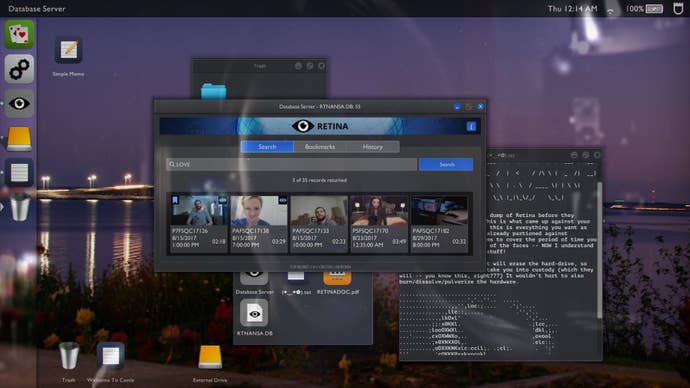
"It's like if I Skype my wife from my hotel room, I'm going to set my phone up so that they can see how nice my hotel room is or not, and make sure I'm looking good and well lit and start talking," says Barlow of what he means by the natural freedom imbued for the actors in their scenes. "And then if I hear that my wife's had a bad day, something awful's happened, then I'm going to probably take the phone and sit down. Like all that kind of body language and how you relate to the person on the other end of the screen was all the stuff we had just got to play with and riff on."
Even if conversations and calls are often split up in terms of exploration, they were filmed simultaneously so that it's an actual conversation, with each character wielding the 360-degree rig. For actors, it was an appealing idea. But having publisher Annapurna Interactive's backing helped get the cast on board.
The script itself sent to agents and actors was massive. Falling somewhere between a staggering 200 to 300 pages ("There was a point where I was told that no agent would pass it on to their client because it was too big"), written in rough chronological order, it was very unlike what would become the final project for Telling Lies.
"When it came time to cast it, the fact that you have an Annapurna on the top of the script meant that there were certain people you can speak to who if you said 'would you like to come and do a video game?' They would just say 'no, that's not the kind of thing my client would do.' But when you said 'would you like to do an Annapurna video game?' They're like, 'well, I'll at least read the script.'"
Part of the high-profile casting process came from a desire to reach even more people than Her Story did. In enlisting Hollywood actors, the appeal to mainstream audiences extends far greater.
Another element Barlow's taking seriously this time around is localization, a big divergence from Her Story which has only been available in English. Telling Lies is aiming to be localized in Asian languages, French, Italian, German, Spanish, and "a couple more," says Barlow. But with localization has come new complications. (And a consequently longer development cycle.)
"It's weird because obviously the words being part of how you navigate this, I don't think there's any other video game where each localized version has slightly different level design," says Barlow. "Here, if you play in French, we need to make sure that in French things interconnect. [...] Everyone's very excited because when you speak to the localization people normally their role as a translator is a very prosaic one. It's like, oh, just take the words, translate it, make it sound half decent. But here they're actually driving the gameplay, and it's a core experience of the whole thing."
A New Era for FMV Games
Telling Lies will be releasing in a time where FMV games and interactive video are increasingly becoming popular and recognized. Just at the Independent Games Festival last week, the FMV game After Hours took home the award for Best Student Game. For Barlow, it's been an exciting time to see the embrace of live human performances in video games.
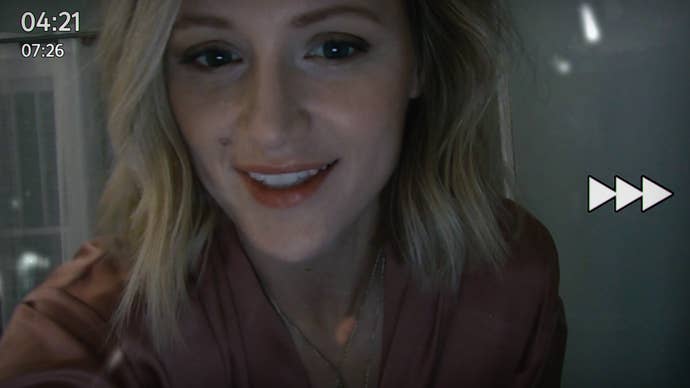
"There's video games doing more and more stuff with live action, but we're now seeing the TV world increasingly starting to play with this now. I remember when I saw that Steven Soderbergh was doing an interactive murder mystery starring Sharon Stone for HBO, and I was like dammit, I'm done. I'm like, no one needs me. You got Soderbergh and HBO and Sharon Stone," laments Barlow. "Luckily that didn't set the world on fire."
But Barlow tells me he feels less of a comradery with Black Mirror: Bandersnatch, the interactive movie that was released on Netflix last year, than he does with Netflix proper. He explains how he's watched his kids interact with the streaming platform; how they watch a random episode of a show because they like the thumbnail, and then immediately go onto YouTube to watch someone talk about whatever they just watched, and then rewatch the episode over and over again. Like Telling Lies, consuming media has become its own nonlinear, multithreaded activity.
Telling Lies is aiming for release soon in 2019 for PC and iPhone first, though he hopes to bring it to consoles too. He tells me that localization has slowed things down quite a bit in its pursuit to reach as many players as possible upon its eventual release. Still, he's excited about its upcoming release, but there's still a fraction of him scared of alienating the fanbase he cultivated with Her Story.
"The thing that makes me panic at night is like, what if I've changed too much? There will be people that are like 'I wanted a pure murder mystery.' People that say 'Oh I preferred the simplicity of Her Story.' But I think hopefully most people will be excited to see something that attempts to be as ambitious as this, and hopefully will enjoy that generosity," he says.
"I think the biggest unique thing about Her Story was that thing of going 'no, you can do whatever you want and uncover the clips in any order.' There are literally no scripted bottlenecks, there is no hand holding, there are no artificial limiters on how you do this. You can come in and type certain things and you can get right to the heart of this mystery if you want to. And I think [Telling Lies] doubles down on this. Really, this is yours to explore and you can just really lose yourself in it."
